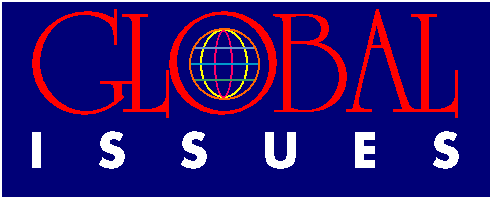
Electronic Journals of the U.S. Information Agency
Volume 1, Number 12, September 1996
COMMUNICATIONS: THE INFORMATION SOCIETY

COMMUNICATIONS: THE INFORMATION SOCIETY
(Download Adobe Acrobat Version)
The Global Information Infrastructure (GII) -- a massive network of communications networks -- will forever change the way citizens around the world live, learn, work and communicate....The GII is a historic undertaking. It is strengthened by participation, bolstered by openness, and fortified by strong nations and talented people pursuing dreams of a better tomorrow.Join me in building the 21st Century's first great achievement.
- Vice President Al Gore
FOCUS
By Vice President Al Gore
NEW TECHNOLOGY BENEFITS ALL NATIONS
In an interview, Larry Irving, assistant secretary of commerce
for communications and information, says that developing nations
can and must be a part of the information age.
By Edmund Scherr
THE INTERNET: CREATING A DEMOCRATIC GLOBAL
VILLAGE
In an interview, Stephen Goldstein of the National Science
Foundation, says that the Internet is a wonderful tool for the
free and open exchange of information and opinion throughout the
world.
By Jerry Stilkind
COMMENTARY
THE ELECTRONIC REVOLUTION AND DEVELOPING
COUNTRIES
By Jerry Stilkind
THE INTERNET IS CHANGING HIGHER
EDUCATION
By Neil Rudenstine
DATA DELUGE: THE CHANGING ROLE OF THE
MEDIA
By Ralph Begleiter
MEDIA DEVELOPMENTS AND PUBLIC
POLICY
By Johanna Neuman
IMPLICATIONS OF THE REVOLUTION IN
COMMUNICATIONS
AMERICA'S INFORMATION EDGE: THE NATURE OF
POWER
By Joseph Nye, Jr. and William Owens
DEPARTMENTS
A BIBLIOGRAPHY ON CREATING AN INFORMATION
SOCIETY
By Martin Manning
ARTICLE ALERT: BUILDING AN INFORMATION
SOCIETY
KEY INTERNET SITES
Global Issues
Electronic Journals of the U.S. Information
Agency
(Hyperlinks in this issue have been updated as of September 30, 1998)
USIA's electronic journals, published and
transmitted worldwide
at two-week intervals, examine major issues facing the United
States and the international communityand inform foreign publics
about the United States. The journals --
Economic Perspectives, Global Issues, Issues of Democracy,
U.S. Foreign Policy Agenda, and U.S. Society and
Values -- provide analysis, commentary, and background
information in their thematic areas. French and Spanish language
versions appear one week after the English version. The opinions
expressed in the journals do not necessarily reflect the views or
policies of the U.S. government. Articles may be reproduced and
translated unless copyright restrictions are cited on the
articles.
Current or back issues of the journals can be found on the U.S.
Information Agency's International Home Page on the World Wide
Web at
http://www.usia.gov/journals/journals.htm. They are
available in
several electronic formats to facilitate viewing on-line,
transferring, downloading, and printing. Comments are welcome at
your local USIS office or at the
editorial offices.
You may also communicate via e-mail to
![]()
In an interview, Peter Knight, chief of the Electronic Media
Center at the
World Bank, says that developing countries can
begin to take part in the information revolution.
The president of Harvard University notes that all the
information in the world will be of no avail unless it is used
intelligently and wisely.
The CNN world affairs correspondent writes that journalists
should be guides to what people want to know about and what they
should know about their community, country, and world.
The foreign editor of USA Today notes that the high speed
dissemination of information has just begun. And with it will be
new challenges for government, for armies, and for
journalists.
Excerpts of a panel discussion on the impact on information
advancements on democracy.
Knowledge, more than ever before, is power. How a country uses
its information resources will influence its place in world
affairs, the authors say in this abridgment of their Foreign
Affairs article.![]()
Books, documents and articles dealing with an information society
and the building of a Global Information Infrastructure.
Abstracts of recent articles on a global information society
World Wide Web sites for basic documents and sources of
information on creating an information society, plus Internet
addresses for sites to U.S. legislation and government
agencies.![]()
Global Issues and Communications - I/TGIC
U.S. Information Agency
301 4th Street, S.W.
Washington, D.C. 20547
United States of America
Publisher....................Judith S. Siegel
Editor.............................John Walsh
Managing Editor.................Edmund Scherr
Text Editor........................Jim Fuller
Internet Editor.....................Tim Brown
Associate Editors...................Guy Olson
...................................Wayne Hall
Contributing Editors.........Judith Greenspan
...............................Jerry Stilkind
................................Edmund Scherr
Reference and Research.........Martin Manning
..........................Monica Mieroszewska
Art Director..................Patricia Gipple
Editorial Board...............Howard Cincotta
.............................Judith S. Siegel
..............................Pamela H. Smith
![]()